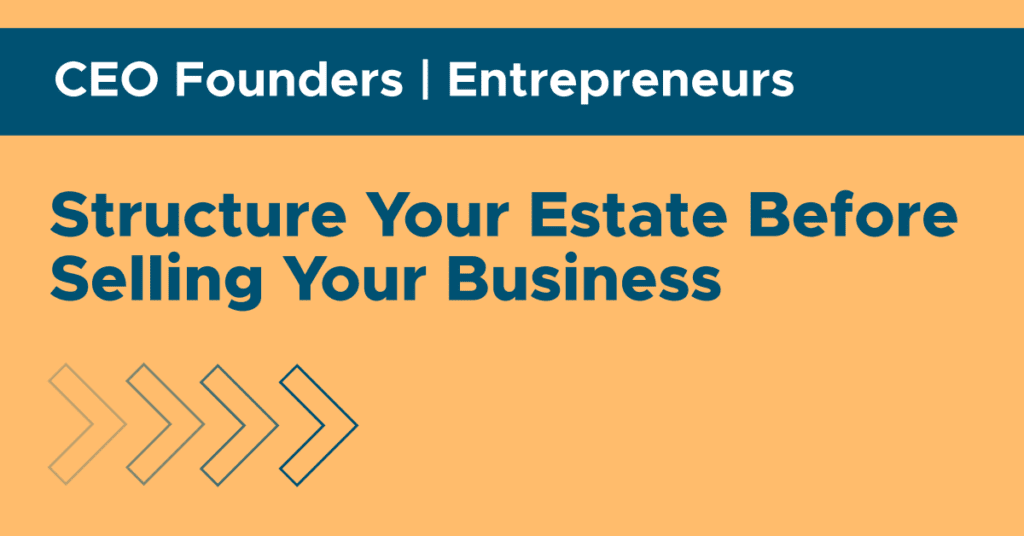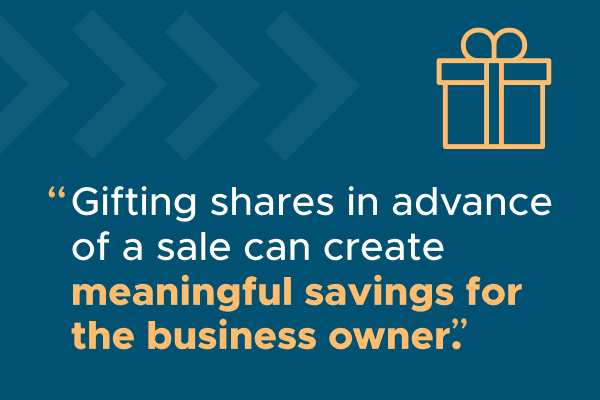An estate plan is the necessary foundation before selling your business. If you don’t already have a plan in place as you begin the pre-transaction planning process, formulating one with your attorney, with the help of your wealth advisor, is the first step. Before you know how much wealth is available for transfer to your beneficiaries, you must determine how much you will need for yourself. This process begins by establishing your spending needs and goals.

Will I Have Enough To Live Comfortably For The Rest Of My Life?
Cresset can help you evaluate how much money you will need to meet your lifetime goals. This typically includes annual lifestyle expenses and education expenses for children or grandchildren. An important factor to guide your thinking is that your financial requirements post-transition could change quite drastically. For example, after the sale you might be responsible for expenses that were previously run through the business, such as insurance, cars, or travel. It is common for a business owner to discover during this process that day-to-day expenses that will need to be supported post-sale are at least 50 percent more than he or she initially expected. Cresset works with our clients to make sure all expenses are accounted for, and to quantify how much it will take to fund them for the rest of their lives.
Will I Be Able To Leave A Legacy To My Family And The Causes That Matter To Me?
“Surplus” capital is what remains after your lifetime capital needs are adequately covered. Think of surplus capital as funds for discretionary spending on things like vacation homes, family legacies, and philanthropic endeavors. It is vital that you first ensure that your lifetime capital needs can be met, so that you can deploy funds to your beneficiaries without risking your long-term financial well-being. It is also important to manage the expectations of family members and other potential beneficiaries, who may be expecting to receive more than you are prepared to give.
When Do I Want To Exit The Business?
Another major consideration is the timing of your planned exit from the business. This could have a significant impact on your ability to achieve your lifestyle goals, because cash flows from business profits, as well as tax advantages from running certain expenses through the business, will disappear. Seek expert advice to determine the value of your business, and whether that amount would be sufficient for your lifestyle needs. Preparing for a sale, particularly making the changes needed to enhance business value, can take at least two years. The sale process itself can take 12 months. Depending on the deal terms, the owner might be required to stay with the firm for another 12-18 months. Therefore, the earlier you begin to plan for your retirement or to exit from your business, the more likely you will be able to meet your desired timeline and your desired wealth target.
How Can I Ensure My Tax Situation Is Optimized?
Once you have confidence that the sale proceeds will be sufficient to provide for your lifetime capital needs, decide what you should do with the remainder. To the extent that you are likely to end up with a taxable estate, an early gift or transfer of shares can result in significant tax savings. These shares are often eligible for a valuation discount since the recipient often has no control over the underlying business and is prevented from selling the shares in the open market. This discount can create a scenario in which the actual amount of wealth transferred is far greater than how it is valued for tax purposes.
Gifting shares in advance of a sale, and possibly combining with other tax mitigation strategies, such as a donor-advised fund, can also create meaningful savings for the business owner.

Don’t Forget To Consider Pre-sale Charitable Contributions
One common way to mitigate taxes in the year the business is sold is to make a charitable contribution in the same year. While this can be done either pre- or post-transaction, if it is done far enough in advance of the sale, the business owner can avoid the capital gains tax that would otherwise be associated with the contributed shares, in addition to receiving the charitable income tax deduction. It is important to remember, however, that there are situations in which the ability to take a larger deduction for a cash contribution might make more sense. For that reason, it is important to evaluate the impact of both pre- and post-sale contributions to ensure charitable gifts are made in the most tax advantageous manner.
How Can We Help
At Cresset, we have assisted over 100 entrepreneurs through liquidity events and business sales, advising on pre-sale and post-sale planning, exit strategies, tax optimization, succession, and estate planning. Ensure that your estate plan is secure and your tax situation is optimized ahead of selling your business. This is key to ensuring a successful transaction.
We are happy to schedule a strategy session to discuss your unique needs. Reach out any time.
Subscribe to Entrepreneurial Edge
Sign up for our monthly newsletter with the latest thought leadership, event invites, and resources for entrepreneurs.
By providing your email address, you consent to receive messages from Cresset regarding our services. View our Privacy Policy.
About Cresset
Cresset is an independent, award-winning multi-family office and private investment firm with more than $237 billion in assets under management and advisement (as of 1/1/26). Cresset serves the unique needs of entrepreneurs, CEO founders, wealth creators, executives, and partners, as well as high-net-worth and multi-generational families. Our goal is to deliver a new paradigm for wealth management, giving you time to pursue what matters to you most.
https://cressetcapital.com/disclosures/
